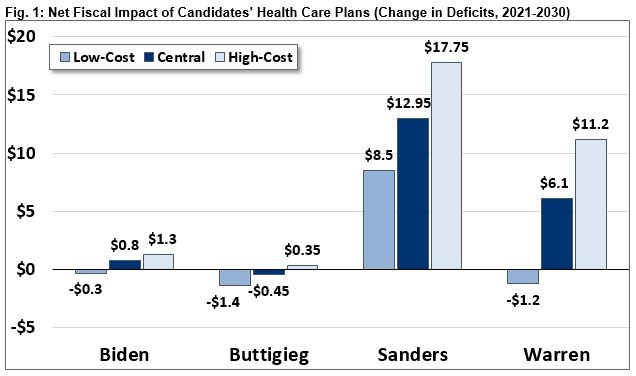on
Verdure
- Get link
- X
- Other Apps
No, that is not a typo. The cost of Bernie Sanders Medicare-for-All (M4A) plan is $13 trillion dollars. How does this stack up to other candidates? The Committee for a Responsible Federal Budget does the math.
Whereas Mr. Sanders plan would cost $12.95 trillion between 2021 and 2030, Mrs. Warren’s plan would cost $6.1 trillion, still expensive but half of the Sanders plan. Mr. Biden’s health care plan would increase federal deficits by only $0.8 trillion, whereas the Buttigieg plan would actually save the federal government $0.45 trillion.

Part of the reason for the extra cost for the Sanders and Warren plan is that they cover more people.
Biden’s plan would cover an additional 15 to 20 million people, compared to 20 to 30 million for Buttigieg and 30 to 35 million for Sanders and Warren
The Sanders plan additionally is very expensive as it would impose virtually no out-of-pocket costs on patients. The Warren plan is very similar to Sanders plan, but the fiscal impact is lower as Warren is mandating higher levels of employer contributions.
Biden’s plan is basically ACA+, increase ACA subsidies and offer a public option. Buttigieg, like Biden, would increase ACA subsidies, create a public option and cap out-of-pocket expenses. The Buttigieg plan saves money whereas the Biden plan does not as Buttigieg takes a more aggressive stand on prescription drug price negotiation and reducing patient cost on out-of-network providers.
Your reaction to these plans likely depends on your priors about whether government health insurance is good or bad. Does government lower cost from lower administrative costs or will it be inefficient (think the DMV running your health care system). Will government negotiation lower prices or drive out innovation and lower highly educated workers’ desire to go into medicine (or all of the above). Is government health insurance an impartial third party and less calculating than private health insurance, or is government health insurance likely to be captured by special interests? Is societal solidarity or individual responsibility more important?
If a Sanders/Warren Medicare for All plan were to be enacted, it would likely be highly popular for the first few years. However, would quality degrade over time? Would it be financially sustainable as baby boomers age? Would individuals with high-quality private insurance revolt against a less generous government insurance package?
One thing is for sure, a Sanders/Warren Medicare for All would certainly increase the federal deficit.
Comments
Post a Comment